There is still the need for a better Goodreads alternative
Goodreads is still providing the worst experience when it comes to book tracking. Oku and Literal tried to create the modern Goodreads alternative users were hoping for. But are they still active?
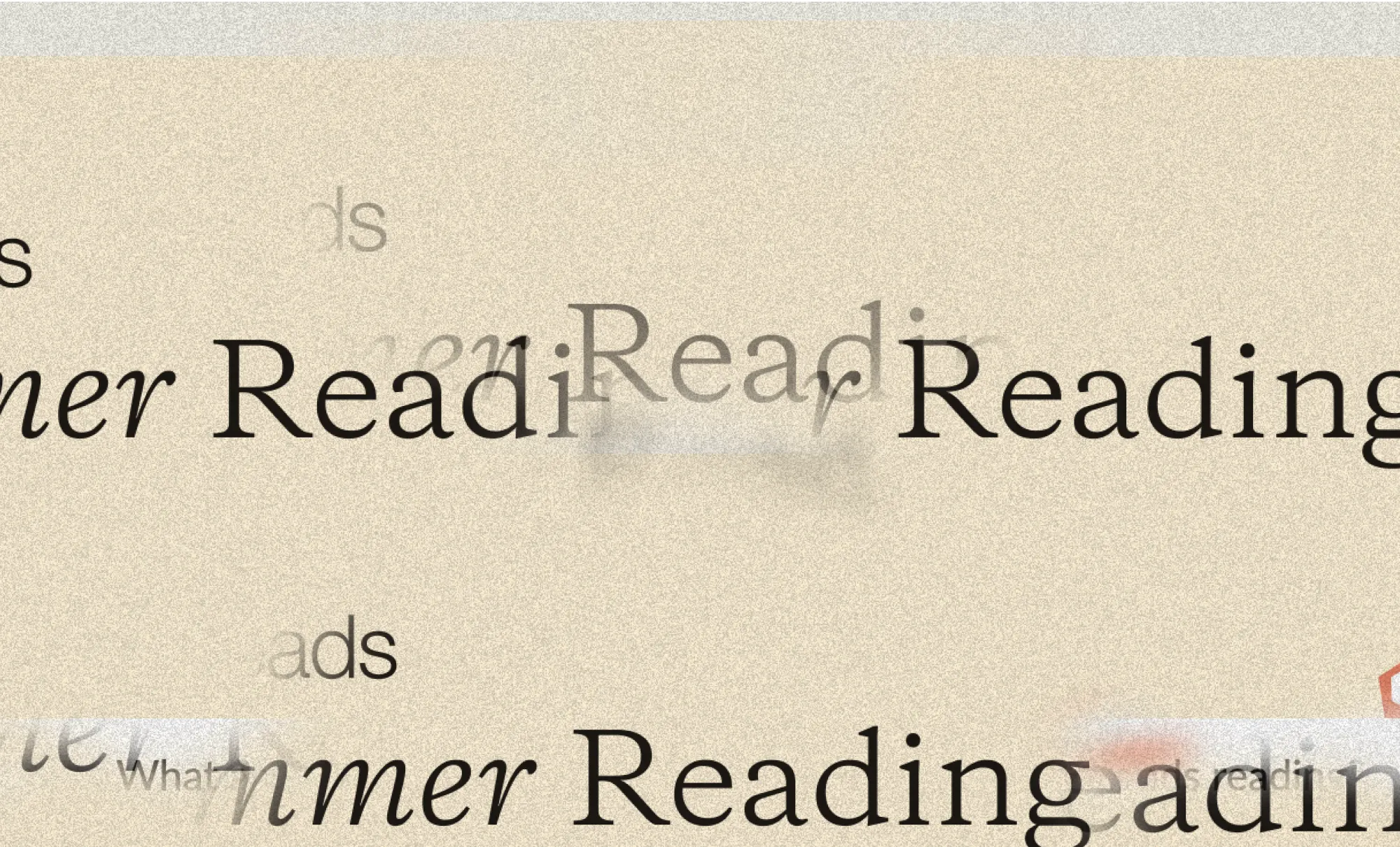
Tracking your reading can be motivating and fulfilling. When you get the chance to visualize your reading progress, it helps you fostering a sense of accountability, and encourages you to build a consistent reading habit. Once you start organizing your reading habits, keeping track of the books you have read, and analyze your reading trends, you can identify patterns and preferences, which could make your reading experience more enjoyable and efficient. Tracking my reading progress and habits, means that I have a personalized digital library. So I know what kind of books I own, which I have not read so far, and the ones I have on my reading list up next. I do not care about the social aspect of book and reading tracking services that much. Also, since those kind of platforms always focus on reading goals and reading challenges, I feel pressured by that.
I am reading because I enjoy it, not because I want to win a challenge, or read a specific number of books every single year. Because then, chances are high I need to force myself to read, so I can reach those reading goals. I read for the pure enjoyment, and I use reading and book tracking apps simply to know which books I own, which I would like to buy, and which I am going to read next. Having an overview of my reading progress, the highlights I captured from books, and the books I have read so far, also gives me the chance to reflect on my reading habits, and identify what I enjoy reading. Since I am reading for the enjoyment (and to learn and grow) that kind of self-reflection does indeed help me to create a more fulfilling reading experience.
The social aspect of book tracking apps
Nevertheless, I do get the point of the social aspect of book tracking apps. There are people who might want to challenge themselves and others when it comes to reading goals. Additionally, a dedicated platform to track your reading progress, create book wishlists, and engage with fellow readers to discuss those books sounds like a nice social network experience. Connecting with people over books is probably one of the nicest ways to get to know each other.
For multiple years, Goodreads has been that platform. If you wanted to track your reading progress, book wishlists, and connect with fellow readers to discover new books, Goodreads was the way to go. But then, Amazon bought it, and things went downhill fast. Since the platform kept growing and millions of users joined it, you were able to quickly experience the lack of effective moderation. Goodreads got swamped with negative and biased reviews, it got plagued by trolls who even left malicious and unhelpful reviews to directly target specific authors, and overall the experience became really worse.
While Goodreads once was not only a great platform to connect with readers and discover new books, it also helped indie authors to reach new readers, and market their books. However, now Goodreads charges exorbitant fees, which makes it hard to leverage the platform as an indie author.
The downfall of Goodreads
Amazon owning Goodreads is already reasoning enough to not use that platform at all. What made it completely unusable for me is its outdated design, bugs, and limited features. It is clear that there were no intentions to keep up with modern trends, design, and innovations to make the whole platform more usable and appealing. Beyond that, there were no actions at all over the course of the last couple of years that would introduce some changes and improvements. It seems like Amazon has no intention to further develop the site, and the users and authors who are still using it seemed to fine with all negative vibes that are going on there.
I still feel like that there is the need for a better Goodreads alternative. There is room for a platform that not only allows people to track their reading progress and books, but also connect with fellow readers. At the same time, I would like to take one step further and state that the very same platform could allow readers to connect with authors, and allow authors through unique social features to interact with their readers. And to go another step further, why not use the same platform to highlight independent book stores in the regions of the users whenever they discover a new book, and therefore encourage users to shop new books locally rather than supporting Amazon, which clearly does not care about those independent book shops and indie authors at all.
The rise of Literal and Oku
Around 2020/21 there was hope as suddenly two apps appeared that strived for the same goal: building what Goodreads should always have been, a lovely and beautifully designed place to track your reading progress, discover new books, and connect with fellow readers to discuss those books. The apps are called Oku and Literal. Both apps give you the possibility to track your reading and build up a digital library. The social aspect of following people, discuss books, write reviews, create clubs, and more is a core focus of those two platforms. Oku and Literal delivered the fresh Goodreads experience so many users were looking for.

I signed up for Literal since I enjoyed organizing my library in shelves, quickly scanning in book barcodes to add books I discovered in a store to my wishlist, and getting recommendations based on the books I have read and put on my reading list. Since Oku and Literal launched at pretty much the same time, I created an Oku account too, which gave me the possibility to compare both platforms with each other.
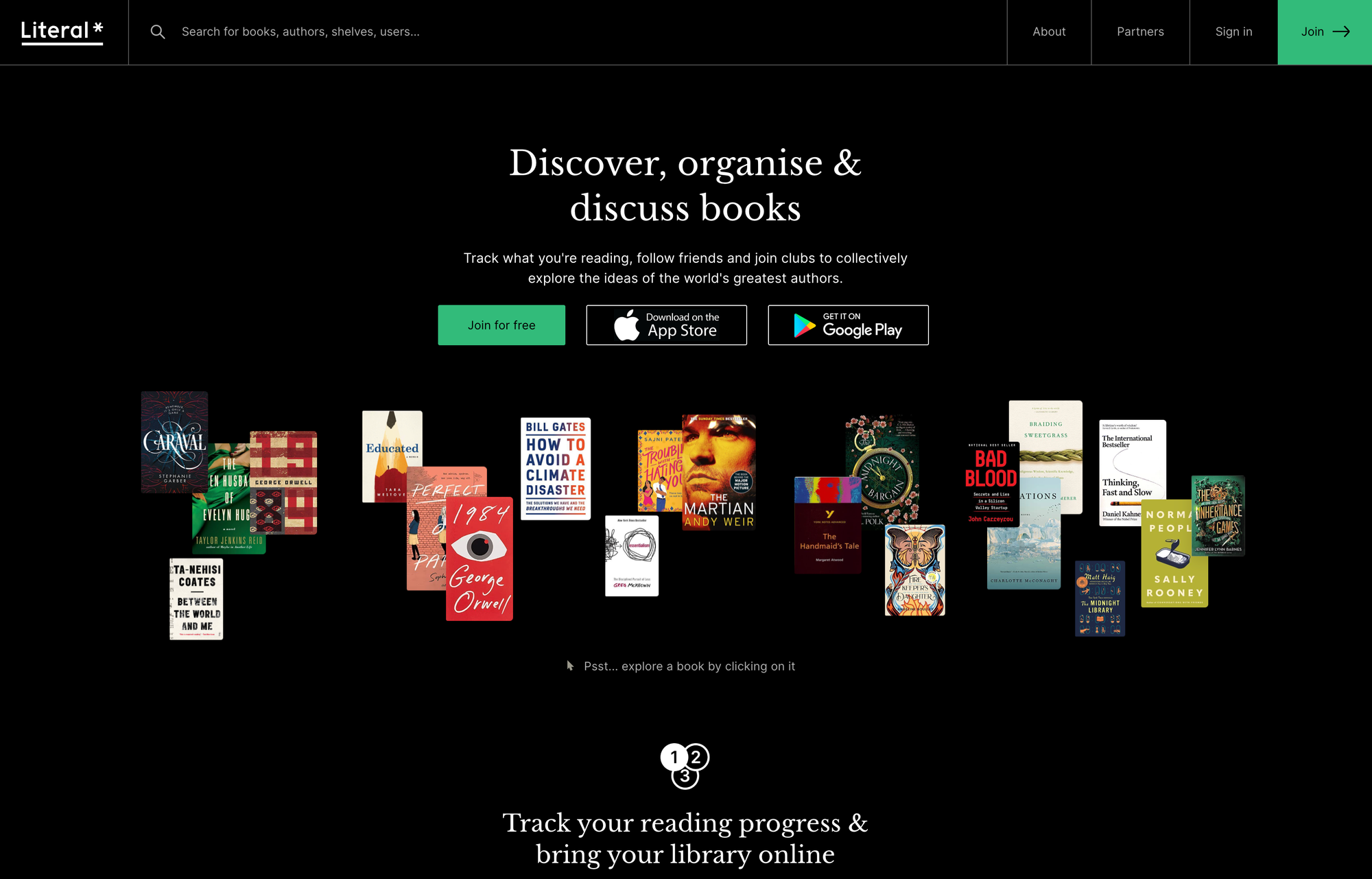
What immediately stood out to me was the lovely design of both platforms. The lack of modern and innovative design and experiences that made Goodreads unusable, got replaced by pure love for detail by Oku and Literal. After a couple weeks of usage, Literal seemed like a more vibrant place, so I decided to stick with it. While I wanted to use Literal for personal rather than social purposes in the first place, I started following other users, since I also received some follows. Suddenly, I had a timeline with loads of new book recommendations that actually led to the discovery of loads of new books.
However, at the same time I got faced with loads of people setting and sharing their reading goals and updates, which was exactly what I tried to prevent. Anyway, I simply did not scroll through the timeline that much, and focused on building and maintaining my digital library.
When things got quiet
The apps of Literal kept improving nicely. The team shipped improvements to the Goodreads import, which made it easy for people to switch over, introduced dark mode, shipped the ability to share snapshots of books, highlights, and clubs, launched in-app chat messaging, and improved the offline state. But then, things went silent really fast. In 2022, suddenly Literal did not share any new updates or information about the app. Their social timelines got quiet. The iOS app became really slow and it was no longer that joyful to use. On the other hand, my timeline in Literal did indeed kept being a vibrant place. Nevertheless, I was not the only one realizing that. Suddenly, more and more people mentioned that it seems liek Literal got abandoned. What was interesting: not only Literal did not receive any updates anymore. Things around Oku also got a bit quiet.
Is Literal still in active development?
In 2023, Literal started shipping again. One of the updates introduced the possibility to become a Patron of Literal, which was a subscription that gained the user a couple of benefits and supported the development of the app too. I truly wanted to believe that Literal was still actively maintained, but from 2023 to 2024 not a single update got shipped. No updates were shared on Twitter, Instagram, Facebook, or TikTok. I dug a bit deeper and found out that Mihai Nueleanu, CTO, and Sven Schmidt, Lead Engineer, both left Literal in 2023 and 2024 according to LinkedIn. From the initial founding team, Piet Terheyden, CEO, is the only one who is still actively working on Literal, according to his LinkedIn profile.
As a user, but more importantly as a Patreon subscriber, this feels a bit worrying. When most of the team excited the company, it creates the assumption that things are not going that well. As a user, a clear communication is the least thing to expect. However, there was no communication, until today. While Literal keeps retweeting some Tweets from users casually, there has been no official information whether Literal is still actively maintained. The fact that Oku went silent too, feels almost like they agreed upon something.
Building a Goodreads alternative is hard
Nevertheless, what almost seems like the abandonment of Oku and Literal is also a clear indication how hard it is to build a great Goodreads alternative, especially when you have not one of the most valuable companies of the world backing you. Literal is still a vibrant place. There are still users sharing their reading goals and progresses. At the same time, voices are getting louder whether it is still an actively maintained project. Literal's Patron subscription that got introduced in 2023 was probably the first step to monetize the app to keep the lights on. As there has not been any communicaton, we still do not know if that worked out or not. Although most users might feel some sort of subscription fatigue, it seems like the logical step to take.
Navigating through the Goodreads alternatives
Hardcover
Another fighter who stepped into the ring to compete agains Goodreads is Hardcover. While I went on the hunt for alternatives for Oku and Literal, as I did not want to spend more time with platforms that might shut down soon, I stumbled across Hardcover. Just like Oku and Literal, Hardcover discovered that there is a need for better Goodreads alternative, powered by better recommendations, better and more stats on users' reading history, less spam, and fewer bugs. Hardcover is the product of that, an app that allows users to search and browse for new books, track every book that you want to read, are currently reading, or did not finish, connect with fellow readers, and use a set of stats and tools, including AI, to discover new horizons in your reading journey.
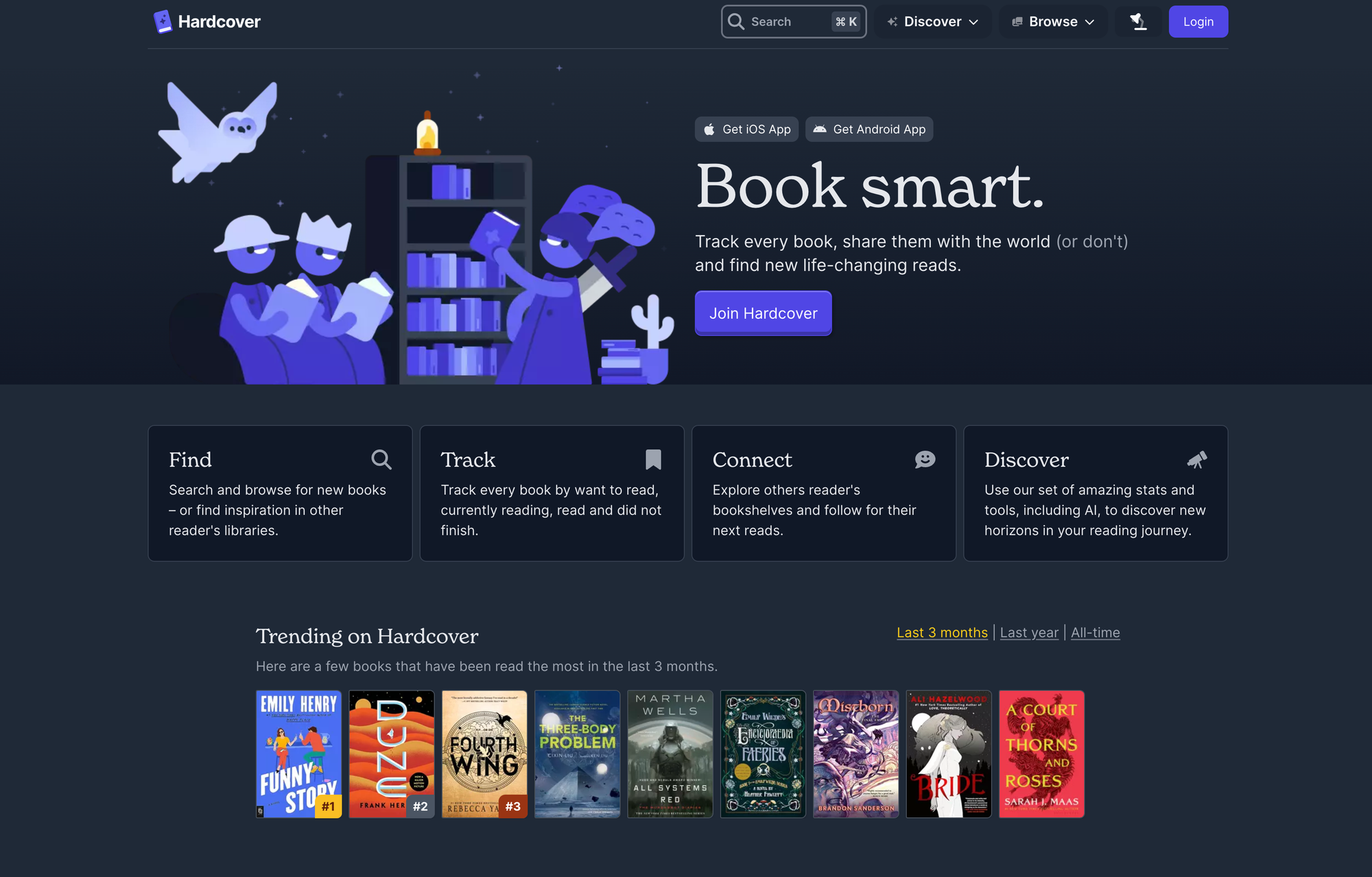
Although I decided to sign up for a Hardcover account, I did not spend that much time exploring it. I felt a bit of a social reading fatigue from Goodreads, Oku, and Literal, and since Hardcover also has a dedicated focus on connecting with others and explore their bookshelves, it was not the alternative I was looking for. While Hardcover's interface might be more modern compared to Goodreads, it almost feels a bit gimmicky to me. Its iOS app, which probably is just a web app wrapper, was quite buggy when I tried it out. Some interactions did not work as intended and overall, I was not happy with the experience.
Storygraph
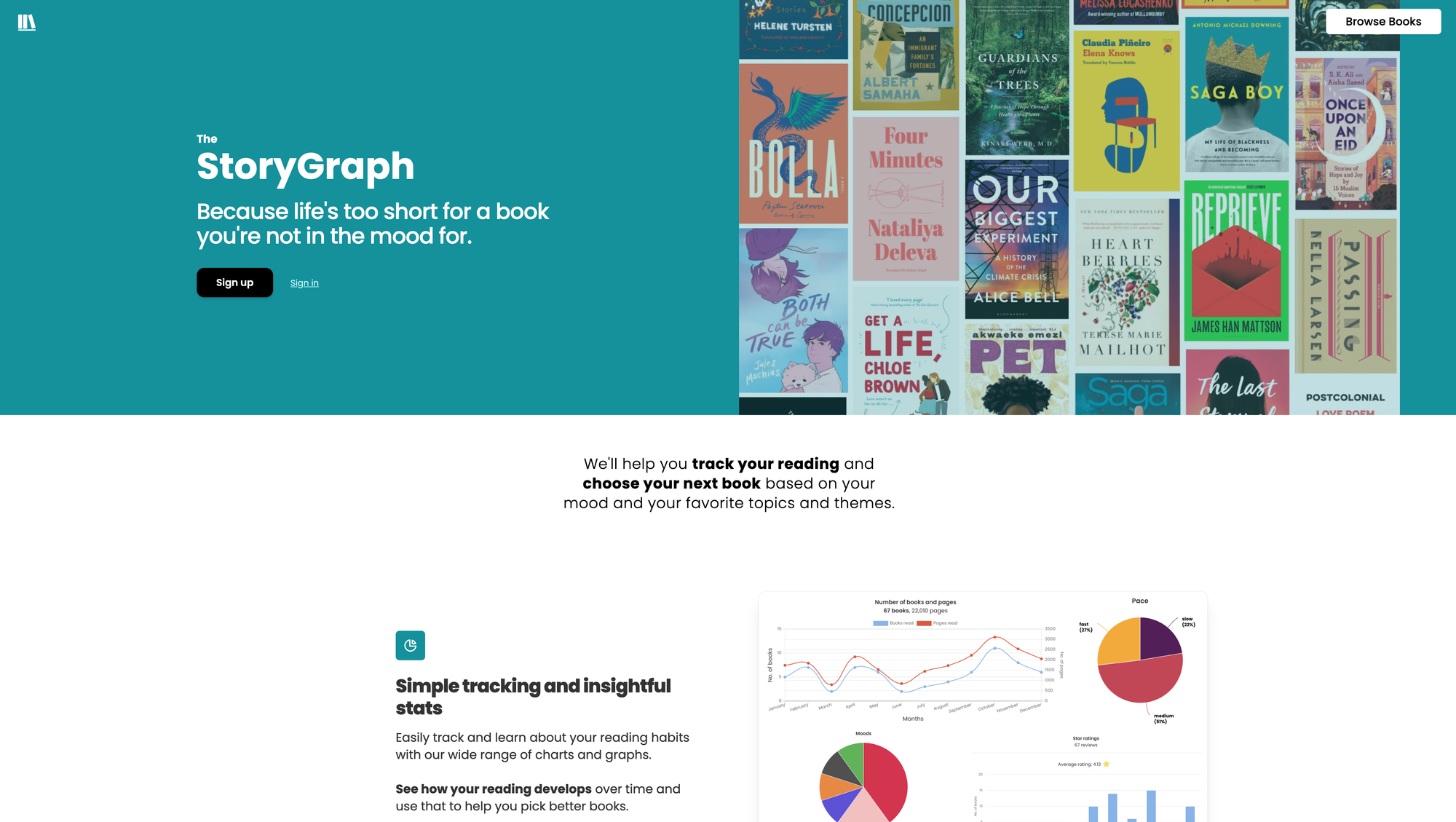
StoryGraph looks lovely and very appealing. As it has apps for iOS and Android, features the possibility to import your Goodreads data, and is free-to-use (with a Pro subscription available to unlock more features) it checks off already a lot of boxes when searching for a better Goodreads alternative. If you are looking for simple tracking tools and insightful stats, StoryGraph is a lovely Goodreads alternative to take a closer look at. It provides a wide range or charts and graphs to visualize your reading habits and progresses. Besides that, those stats, charts, and graphs will provide you with the information you need to see how your reading develops over time, so you can use that information to pick your next favorite book.
When I used Goodreads in the past, the one thing I really enjoyed was how it recommended new books to me that almost every time gained my attraction. It is great to see that StoryGraph focused on building a tailored and personalized recommendation feature, powered by machine learning AI that understands your reading preferences and finds the best books for you. Another feature of StoryGraph that also sounds pretty exciting is discovering new books based on moods. With a couple of clicks you create a comprehensive set of filters to find your next favorite book based on moods like adventurous, funny, fast-paced, emotional, and more. Just like Goodreads, StoryGraph features a social aspect within its app. And in case you do not have people to read with, StoryGraph got machine learning-powered suggestions for great reading buddies.
Besides all of that, StoryGraph is packed with features like custom tags and list, reading challenges, reading journal, up next queue, book clubs, and more. Plus, behind StoryGraph is a small and independent team, building the book and reading tracking app of their dreams. StoryGraph might be the most comprehensive Goodreads alternative out there. I love the fact that they provided a public roadmap, so you can always follow with the features that are currently in the works and planned next.
BookWyrm
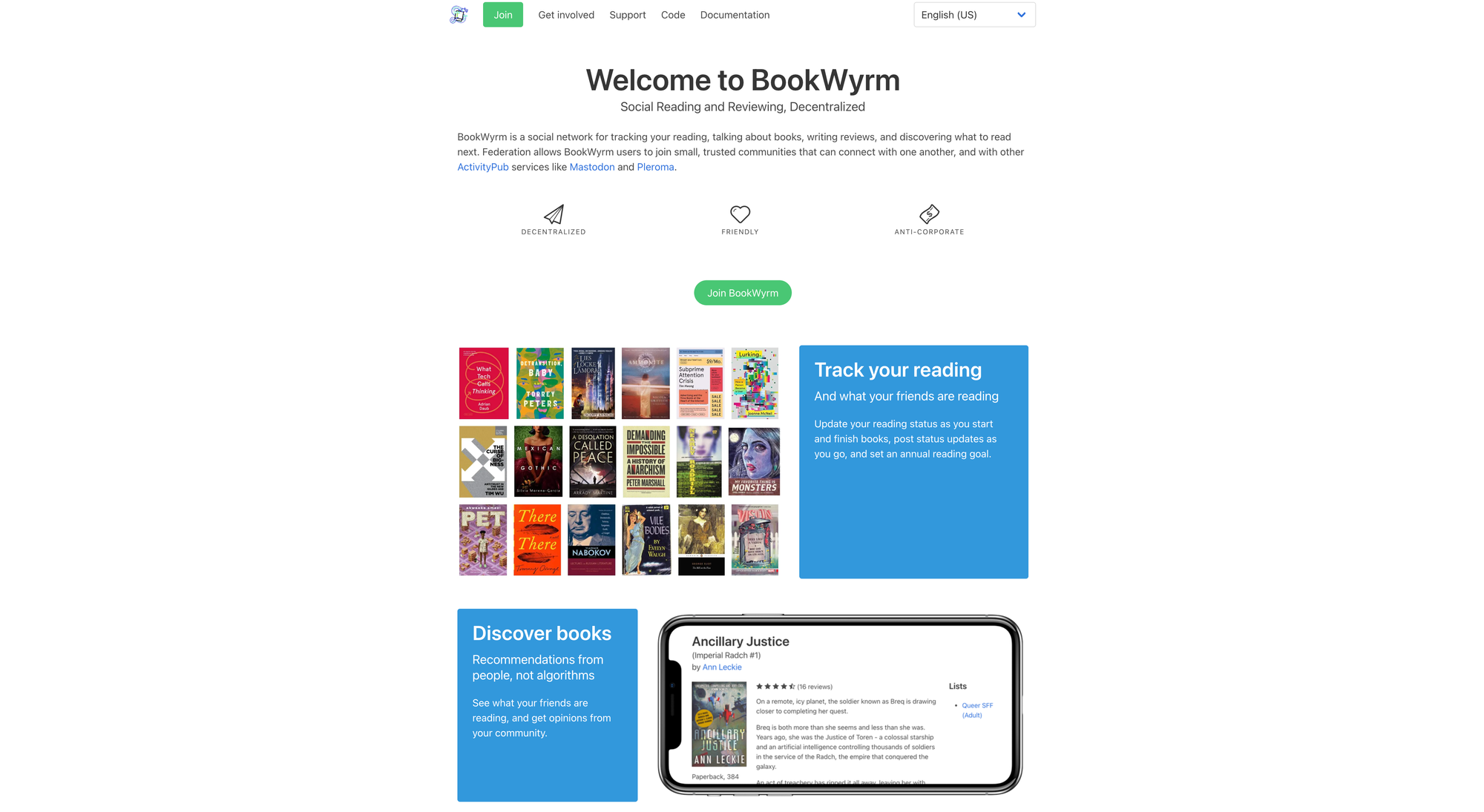
BookWyrm is another Goodreads alternative, a social network for tracking your reading, connecting with other people and talking about books, writing and sharing reviews about them, and discovering what to read next. Compared to the other mentioned alternatives, BookWyrm bets on federation, which allows users to join small, trusted communities that can connect with one another, and with other ActivityPub services, like Mastodon for example. In general, BookWyrm offers the core features you would expect from a Goodreads alternative, which are tracking your reading and updating your reading status as you start and finish books, post status updates as you go, and set an annual reading goal. Additionally, you can see what your friends are reading and get recommendations from people instead of algorithms or AI. With ease you can write reviews and share any comments. Thanks to granular privacy settings, you are in control to decide who gets to see your posts. BookWyrm is also fully open source and you can check its source code on GitHub.
Papertrail
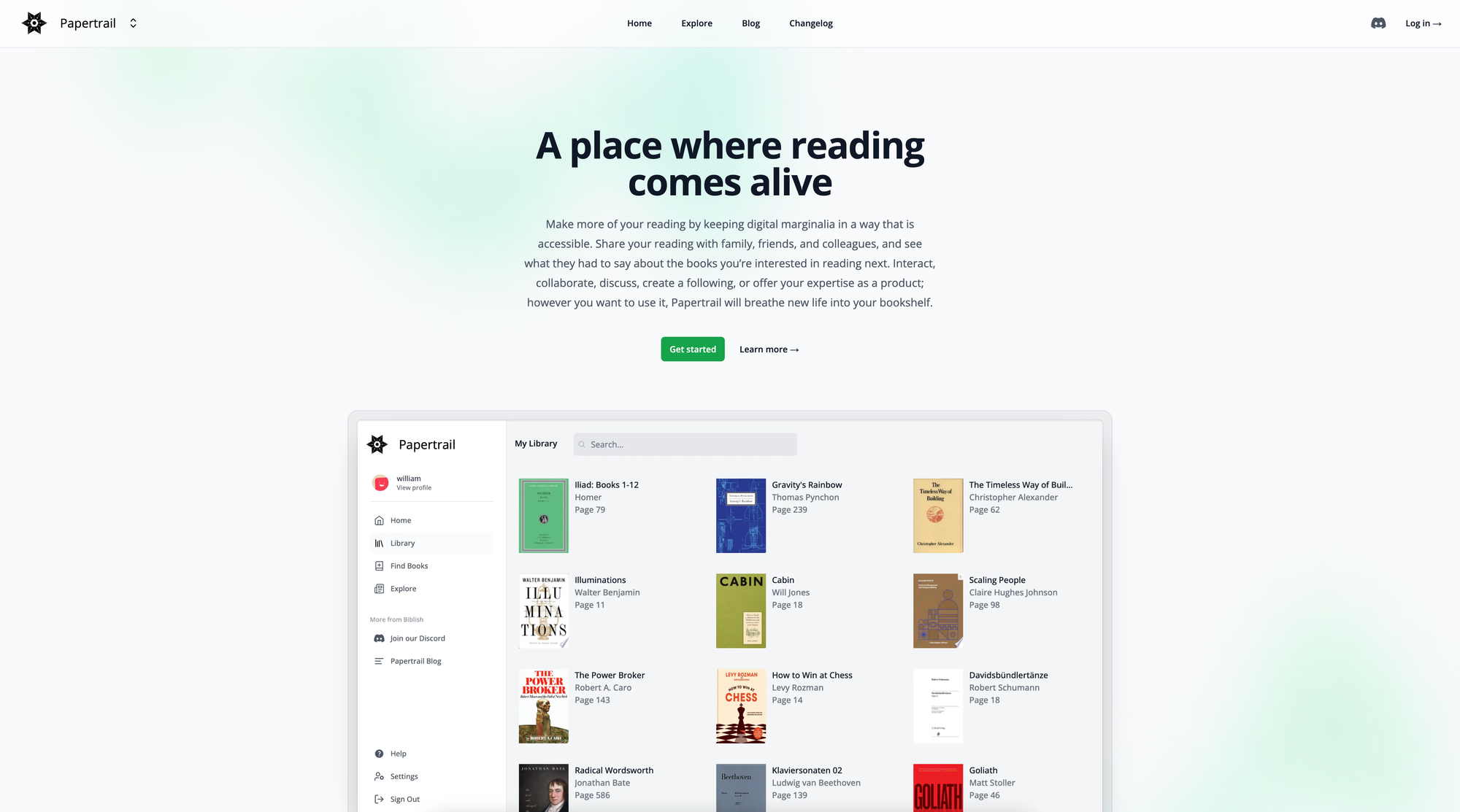
Papertrail is a service by Biblish, a company who works towards the mission to create tools that augment the process of reading writing, publishing, and distributing literature. The idea behind Papertrail is to create a space that makes more of your reading by keeping digital marginalia in a way that is accessible. With Papertrail you can set up your digital library, find books, keep track of reading statuses, and see what others are reading and have to say about the books you are interesting in. So, similar to Goodreads, Literal, Oku, and other book tracking services, Papertrail also offers a certain social aspect. You can interact, collaborate, discuss, and create a following on the platform. It seems like that this social aspect really is at the forefront of Papertrail as it states "we want you to read more, think more about what you read, and share what you think about what you read".
Besides creating and setting up your digital library and discover new books with Papertrail, you can also take notes as you read, and present your reading in a clear and accessible manner. I do take notes about the books I am reading, but instead of doing it publicly, those notes are private within my note-taking system. However, I can see where Papertrail is coming from. Taking notes on the books you read, and then sharing it publicly creates the potential for discussion and interaction points, even days, weeks, months, or years after you shared them. And connecting with people over the books you have read, the notes you took, and the thoughts you had is in fact one of the greatest ways to connect with people.
While all of this sounds great, it is important to mention that I am unsure how active Papertrail is developed. According to its changelog, the last update has been shipped a year ago, and while it seems like Biblish is actively posting on X, the copyright mention in the footer says "2023", the dropdown menu on the website next to their logo leads to localhost sites, and their Discord has 30 members. So, take this all with a pinch of salt, since it is quite annoying setting up with a tool, just to realize shortly after that it is no longer in active development or even shutting down.
PaperTrail
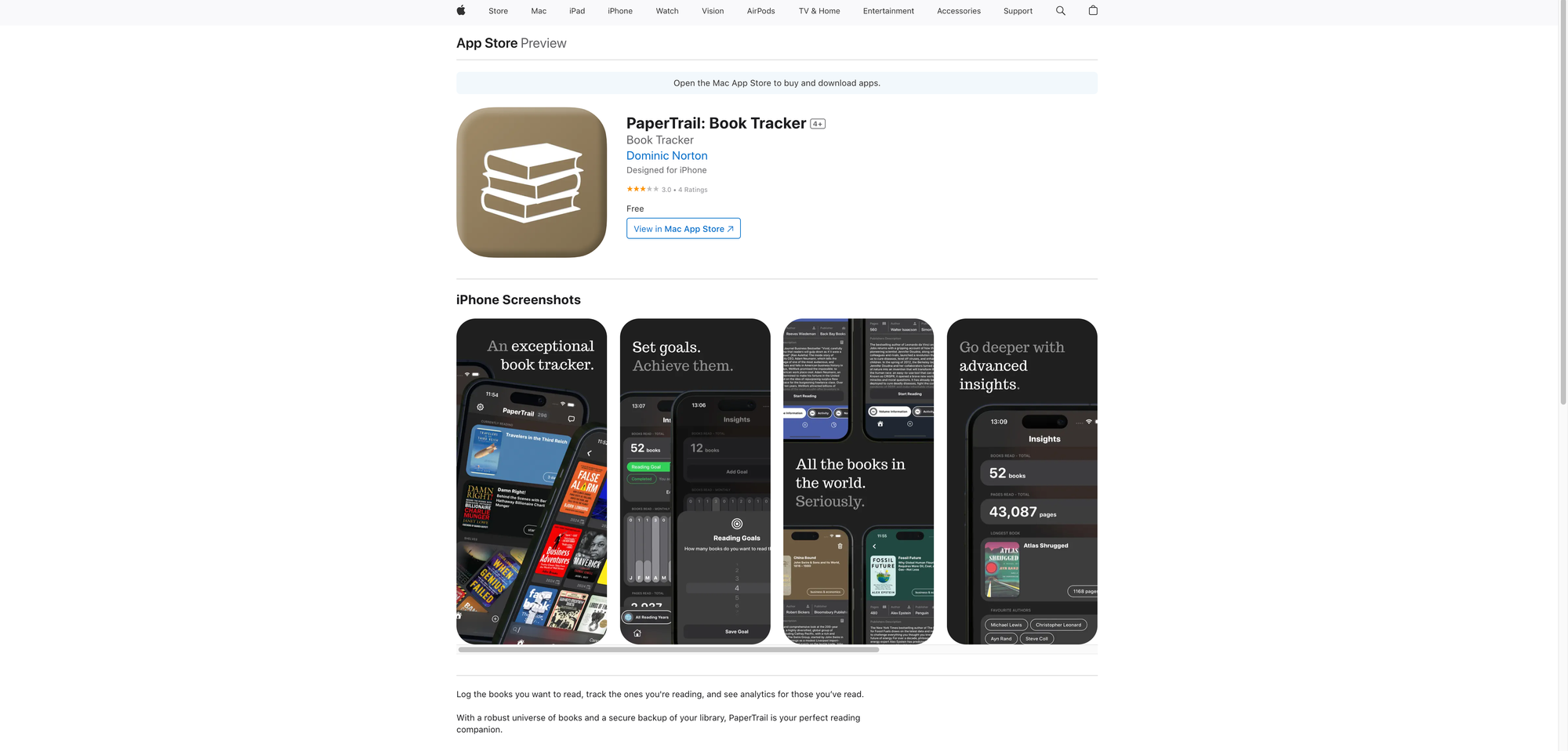
In case you have just read the above featuring of Papertrail, do not get confused, this is a different product, a different app, Papertrail and PaperTrail.
I would not consider PaperTrail a full-fledged Goodreads alternative, since it does not feature the social aspect of book tracking at all, but it rather gives you a private and personal space to log the books you want to read, track the ones you are currently reading, and see some stats and analytics for the ones you have read already. PaperTrail is available for iOS and features a modern design which makes it a joyful experience adding new books you would like to read in the future. As of writing this, the most recent app update has been shipped two months ago, so it seems like the app is still in active development.
When you are searching for an app that lets you create a personal library rather than a social library (as with Goodreads), check out PaperTrail or similar apps like Book Track, Sequel, Bookie, Reading List, or others.
lit.salon
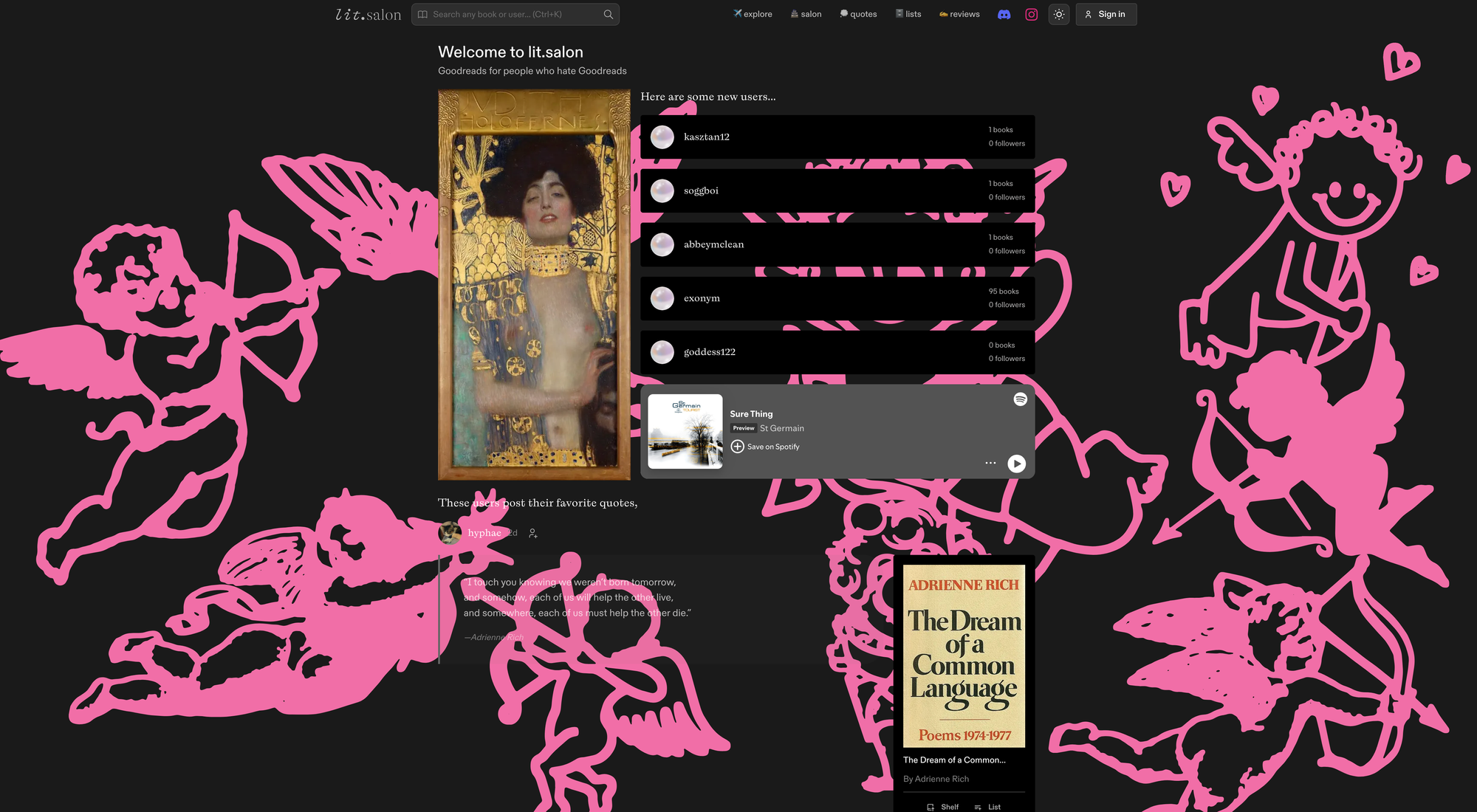
lit.salon entitles itself as Goodreads for people who hate Goodreads. I haven't used Goodreads in a while, so I wouldn't say I hate it, but since Amazon took over, it definitely became worse. What immediately struck my attention when it stumbled across lit.salon were it visuals and overall design. To be honest, at the first quick glance I had no idea what was going on on the homepage, but it definitely provided some fresh and artistic design vibes.
Once I read through the about page of lit.salon, I fell in love with its idea: a digital literary salon that fosters communities, built and maintained by people who care about what other people read and think about it, a single bookshelf where adding a book means "Want to Read", no reading challenges, no reading progress, and nothing that treats reading like statistics. What made Goodreads such a toxic place are reading challenges which led people to read a certain amount of books just to showcase how many books they read, and other folks feeling demotivated and stressed if they did not achieve their goals. Additionally, getting reminded how many pages you read within a year, or the progress you made towards a book, does not help to connect with reading in case you did not read that much anyway.
What I really like about lit.salon is that it gives users the possibility to set up a personalized page with their bookshelf, in a calm and cozy environment, where the social aspect to discover other users and interact with each other is so unobtrusive and just becomes a natural and logical part of the whole platform. The platform is also open to some extent, which means you can read reviews from users, and discover new books without creating an account.
The hope for getting a better Goodreads alternative
It is great to see that there are more companies building better Goodreads alternatives. After spending a serious amount of time researching and reading about all and everything that is wrong and bad about Goodreads, I got the clear image that there is still the need for a better alternative. Tracking what you are reading, the books you would like to buy, getting reading stats, and connecting with fellow readers to discover new books together might sound like a niche in the first place. But Oku and Literal quickly demonstrated that multiple users are seeking for a beautiful designed social book tracking platform. However, the biggest challenge is to turn that into a sustainable business, to keep the lights on. While subscriptions sound logical, people experience subscription fatigue. There is the need to figure out other ways to monetize such a platform. And yeah, that is an incredible hard challenge indeed.
Book Tracker and Sequel for personal curation
For now, I decided to track my reading and all the books I own and the ones I want to buy and read next for my own. I love personal curation, and therefore I started using Book Tracker, and indie app that allows me to manage my book list, track my reading progress, build up a digital library, and save my favorite quotes. There is no social aspect. Book Tracker works for you only, and to be honest, I love that. It is a beautiful designed, native app, that provides me with everything I was hoping for. Book Tracker is build by Simone Montalto. He shares frequent updates about his apps on Mastodon.
Another indie app I also tried out to personally curate my library is Sequel. While Book Tracker is only focused on tracking books, Sequel is a full-fledged media tracker, as it gives you the possibility to keep track of movies, shows, games, and books. It is beautifully designed, feature-rich, and pure joy to use.
In case you are also looking for apps to curate your personal library, make sure to give Book Tracker and Sequel a try. If you are looking for a better Goodreads alternative, check out Oku, Literal, Hardcover, StoryGraph, and BookWyrm, although it is unsure if the first two are still actively maintained.
Till next time! 👋
Support: Do you have a friend who is looking for inspiration, news about design, and useful tools and apps? Forward this newsletter to a friend or simply share this issue and show some support. You can also show some love by simply clicking the button down below and keep this newsletter a sustainable side-project by buying me a coffee. ☕️ 🥰




Discussion